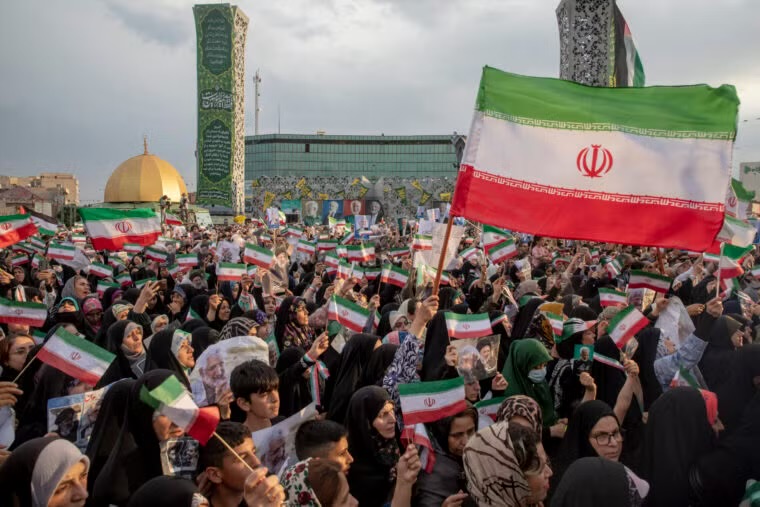Iranian presidential election: ultra-right camp seeking unity against reformist ‘threat’
On the eve of the vote, Amirhossein Ghazizadeh Hashemi dropped out of the race, calling on other candidates to do the same in favour of a unity candidate. Meanwhile, support is growing for Pezeshkian, a moderate backed by two former presidents, Rouhani and Khatami, and former foreign minister Zarif. For his part Supreme Leader Khamenei has criticised the moderate candidate, and, fearing a low turnout, urged Iranians to vote.
Tehran (AsiaNews) – Iranians are wearily heading towards electing the successor of President Ebrahim Raisi, who died on 19 May in a helicopter crash. Although the incident has not been fully elucidated, the prevailing theory is that it was due to mechanical failure.
During the campaign, the Supreme Leader, concerned about a low turnout, appealed to voters to come out and vote; he also issued a warning to the pro-reform candidate, Masoud Pezeshkian, in a country economically reeling from Western sanctions where some jailed political prisoners are calling for a boycott.
One of the right-wing candidates, Amirhossein Ghazizadeh Hashemi, dropped out of the race last night to counter the growing support for the only moderate and pro-reform candidate.
In one of his last public speeches before the vote, Ayatollah Ali Khamenei called for “high participation” at the polls. “We emphasise the importance of high participation (in the election) because it is the pride of the Islamic republic,” he said. “In every election where the turnout was low, the enemies of the Islamic republic have denounced us," he explained.
Although the country’s leadership, including in foreign policy, is ultimately in the hands of the supreme leader, more than 61 million Iranians eligible to vote will have some impact on how the country navigates its role in the region and the world.
Although voters were somewhat left unimpressed by televised debates in which the candidates sparred against each, the latter tried to hammer home the need for voters to cast their ballot.
In fact, the Iranian Students Polling Agency expects the turnout to be around 44.4 per cent, while the pro-government Majlis Research Centre puts the figure at more than 53 per cent.
Results from foreign research organisations are quite different. A survey by the Netherlands-based Gamaan Institute found that only 22 per cent of respondents plan to vote while 12 per cent are undecided. The other 65 per cent said that they intend to stay away.
About 34 per cent of respondents (from a sample of about 78,000) report being unaware of the date of the snap election. For many Iranians, the economic crisis linked to sanctions is the central issue rather than the lack of rights.
Over the past week, some Iranian political leaders and prominent civil society figures, including feminists and rights advocates, have urged voters to boycott the election.
In an open letter, more than 500 teachers, trade unionists, and intellectuals have said that they plan not to vote. From her cell in Evin prison, Nobel Peace Prize winner Narges Mohammadi slams the “illegal elections of the oppressive and illegitimate government”.
She calls on Iranians to join “Women, Life, Freedom”, a movement fighting for human rights and freedoms that emerged following the death of Mahsa Amini, a 22-year-old Kurdish woman who died in the custody of Iran’s morality police after she was arrested for not covering her head correctly.
A major twist in the election campaign came last night when ultra-right-wing candidate, 53-year-old Amirhossein Ghazizadeh Hashemi, decided to drop out, not an unusual practice in Iranian elections, to help right-wing candidates have a better shot at the presidency.
In announcing his decision, Hashemi urged other candidates to do the same “so that the front of the revolution will be strengthened”.
Serving for a year as vice president and a loyalist of the late Raisi, the now former candidate plans to back one of the two main right-wing candidates, namely former chief nuclear negotiator Saeed Jalili or Parliamentary Speaker Mohammad Bagher Qalibaf.
For some observers, this is an attempt to boost the right-wing camp in the face of rising support for Masoud Pezeshkian, the only moderate candidate out of the five left in the race.
Associated with the pro-reform camp, Pezeshkian is heart surgeon by training. Yesterday, he received the endorsement of former President Hassan Rouhani, another moderate, whose administration signed the Joint Comprehensive Plan of Action (JCPOA) with the United States.
"On Friday, we should vote for someone who is determined to remove the shadow of sanctions from the Iranian people," Rouhani said in a video message published by the reformist Shargh daily in which he praises Pezeshkian's "honesty" and "loyalty”.
Supreme Leader Khamenei is not very pleased about Pezeshkian’s stance on the nuclear issue; for this reason, he warned Iranian voters against supporting candidates who “think that all ways to progress pass through America.”
For their part, former President Mohammad Khatami and former Foreign Minister Mohammad Javad Zarif also came out publicly in favour of the pro-reform candidate.
For Khatami, the upcoming vote was "an opportunity" for "change”, while Pezeshkian is a "righteous, justice-seeking, anti-corruption and meritocratic" leader.
20/05/2024 18:05
24/05/2021 17:46







.png)










